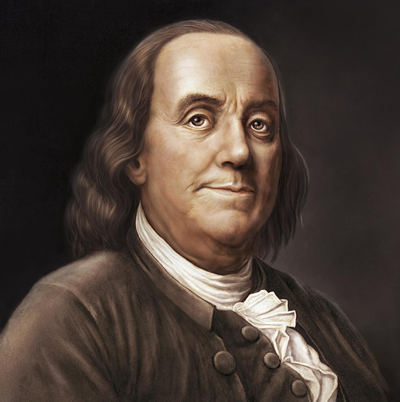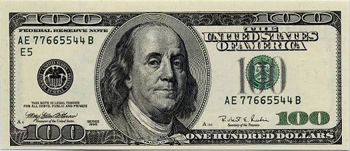Ben Franklin
 Ben Franklin was the tenth son of a Boston soap maker who had seventeen children. Unable to send Ben to more than one year of school, his father apprenticed the boy to his older brother, James, a printer. Ben's duties included helping compose articles, set type, and print pamphlets after which, twelve-year-old Ben would be sent out on the streets to sell the pamphlets. When Ben was fifteen, his brother started THE NEW ENGLAND COURANT, the first newspaper printing local news in Boston. Ben, an avid reader, wrote letters at night and signed them by the name Silence Do good, a supposed widow that was very critical of the world and the way women were treated. The letters were an instant hit with the public. After sixteen letters were printed in the paper, Benjamin confessed he had written them. While others lavished praise upon the young boy, his brother was furious. James would beat Benjamin, so Ben broke the law and ran away. He caught a boat to New York but failed to find work there.He walked across New Jersey and ended up in Philadelphia. Using the last of his meager money, the wet – homeless, disheveled boy bought some rolls to eat. Ironically, it was at that moment on October 6, 1723 - that his future wife, Deborah Read, saw him for the first time. Neither would have dreamed that seven years later they would marry.
Ben Franklin was the tenth son of a Boston soap maker who had seventeen children. Unable to send Ben to more than one year of school, his father apprenticed the boy to his older brother, James, a printer. Ben's duties included helping compose articles, set type, and print pamphlets after which, twelve-year-old Ben would be sent out on the streets to sell the pamphlets. When Ben was fifteen, his brother started THE NEW ENGLAND COURANT, the first newspaper printing local news in Boston. Ben, an avid reader, wrote letters at night and signed them by the name Silence Do good, a supposed widow that was very critical of the world and the way women were treated. The letters were an instant hit with the public. After sixteen letters were printed in the paper, Benjamin confessed he had written them. While others lavished praise upon the young boy, his brother was furious. James would beat Benjamin, so Ben broke the law and ran away. He caught a boat to New York but failed to find work there.He walked across New Jersey and ended up in Philadelphia. Using the last of his meager money, the wet – homeless, disheveled boy bought some rolls to eat. Ironically, it was at that moment on October 6, 1723 - that his future wife, Deborah Read, saw him for the first time. Neither would have dreamed that seven years later they would marry.
In Philadelphia, Ben found work as an apprentice printer. The governor of Pennsylvania was so impressed with the young man, that he sent Ben to London to purchase printing equipment. While he was detained in London for several months, Deborah married another man. Franklin had said he was not ready for marriage. Upon returning to Philadelphia, he did eventually open his own print shop and worked so endlessly and tirelessly, that the citizens began to notice and his business thrived. By 1928, Ben fathered a son, William, whose mother is un-known. Deborah's husband had deserted her and later was reported dead. She was free to marry Ben. She raised Ben's son William as well as their son, Francis and daughter Sarah. Francis died of smallpox at the age of four. Together, the enterprising young couple – ran the printing shop – a bookstore – and another store where Deborah sold such things as soap and fabric. Ben also purchased a newspaper, the PENNSYLVANIA GAZETTE, for which he wrote under aliases - including penning the first political cartoon. His newspaper became the most successful in the colonies. He also began publishing POOR RICHARD'S ALMANACK, under the name Richard Saunders, a poor man that needed the money to appease his nagging wife. It is from these almanacs that we retain many of his witty aphorisms.
Franklin also began his devotion to civic improvement, establishing groups and projects to address such issues as paving and lighting the streets, and environmental clean up. Because books were expensive, and few had access to them, he helped launch the LIBRARY COMPANY - this country's first subscription library. He helped launch the learned society in America, the AMERICAN PHILOSOPHICAL SOCIETY. Seeking better treatment for the sick, he formed a group to establish the Pennsylvania Hospital. He also helped organize Philadelphia's Union Fire Company, to help protect the city's citizens from fire. Because he realized the devastating economic affects that losing ones home to a fire - he helped found a fire insurance company. The hospital, the philosophical society, the Library Company and the insurance company all still exist today.
He also helped set up the postal service. As his printing business thrived, he began to set up franchise printing businesses in other cities. By 1749 he retired and devoted himself to science and experiments. He had already invented a more efficient heating stove, the Franklin Stove - for which he refused to take out a patent. Included in his inventions are bifocals, swim fins, and of course his experiments with the kite and electricity are legendary.
By the 1750's he was actively interested in politics and in 1757 went to London to represent Pennsylvania, as well as Georgia, New Jersey and Massachusetts. He remained there seventeen years. Franklin considered himself a loyal Englishman and loved the amenities that life in London could offer – theatre and witty conversation – which he felt America lacked. When the American's adamantly opposed the STAMP ACT, Franklin went before Parliament in London, and persuaded them to drop the law. But, eventually he grew tired of the corruption he witnessed in the government and royal circles in England and began to believe that the America colonies should unite.
His big break with England happened over the HUTCHINSON AFFAIR. In 1772 Ben anonymously received a packet of letters written to the British government, by Thomas Hutchinson, the royal governor of Massachusetts. In the letters Hutchinson urged his superiors to send more troops to Boston to fight the American rebels. Franklin allowed his friends in Boston read the letters and Hutchinson was forced to flee to England. The English government was furious and publicly condemned Franklin. He returned home ready to work actively for America's independence. Through the years he had asked his wife to join him in England but she feared sea travel. Before he returned home in 1774, word came that Deborah had died unexpectedly of a stroke.
 Having been elected to the Second Continental Congress Franklin was on a committee of five that helped draft the Declaration of Independence. Although Thomas Jefferson did most of the actual writing of the Declaration, much of the contribution was Franklin's. After signing the Declaration in 1776, Ben sailed to France as an American ambassador to the court of Louis XVI. The French loved Franklin's charm and wit, and he was an established flirt among the Parisian women. While in Paris he proposed the idea of Daylight Savings Time. Franklin's popularity with the French was instrumental in their aid and support during the years of America's revolution. He was in his late seventies when he returned home where he continued to serve the people. In 1789 one of his last public acts was writing an anti-slavery treatise.
Having been elected to the Second Continental Congress Franklin was on a committee of five that helped draft the Declaration of Independence. Although Thomas Jefferson did most of the actual writing of the Declaration, much of the contribution was Franklin's. After signing the Declaration in 1776, Ben sailed to France as an American ambassador to the court of Louis XVI. The French loved Franklin's charm and wit, and he was an established flirt among the Parisian women. While in Paris he proposed the idea of Daylight Savings Time. Franklin's popularity with the French was instrumental in their aid and support during the years of America's revolution. He was in his late seventies when he returned home where he continued to serve the people. In 1789 one of his last public acts was writing an anti-slavery treatise.
In his elder years Franklin lived with his daughter Sarah, her husband and seven children. Sarah cared for him as his health deteriorated. He died peacefully in his sleep on April 17th, 1790. He was 84 years old. Attendance at his funeral in Philadelphia was estimated to be 20,000 people. He was buried next to his wife who died sixteen years before him. Benjamin Franklin stands as a giant among our founding fathers. He alone is the only person that signed all four documents that helped create the United States:
The Declaration of Independence (1776)
The Treaty of Alliance, Amity, and Commerce with France (1778)
The Treaty of Peace between England, France, and the United States (1782)
The Constitution (1787)
His skills in diplomacy, writing, negotiating, along with his devotion and belief in the cause, helped shape the future of the United States. Ben - wish you were here.!